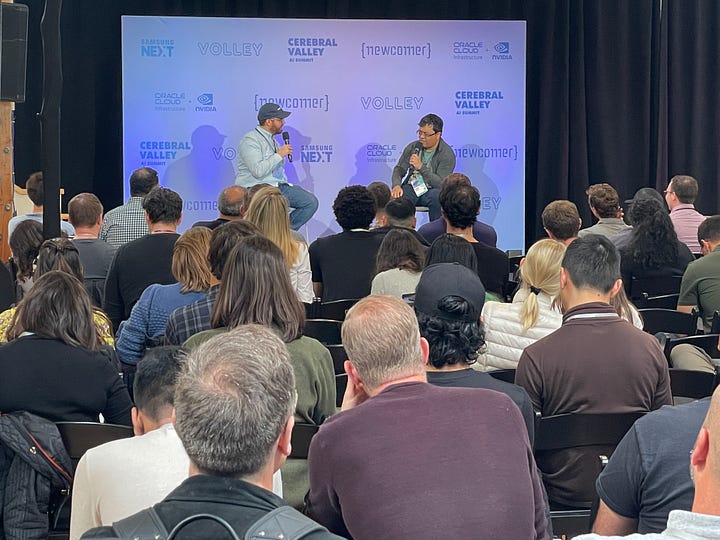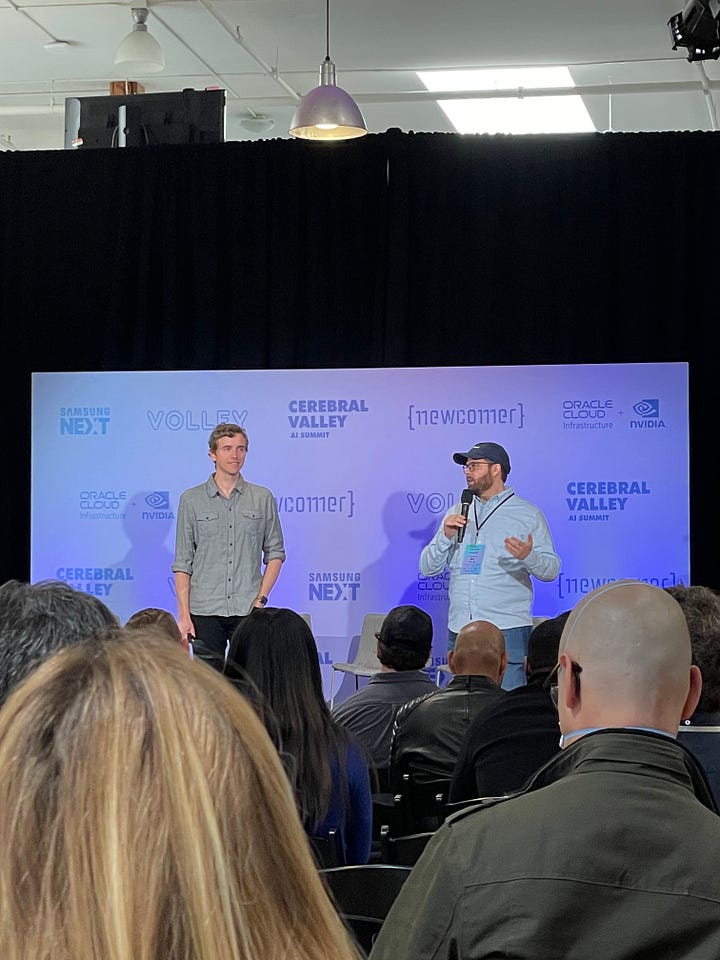Reflections on the Cerebral Valley AI Summit
I feel a lot better about having so many open questions about the world of AI after attending this summit




Last week I had the opportunity to attend the first Cerebral Valley AI Summit - thanks to Eric Newcomer for the great program and the Volley team for providing a great space and being gracious hosts. I went into the Cerebral Valley event looking for answers about how to think about the opportunity to invest in AI. I have struggled to figure out where the real opportunities are as a pre-seed investor, and I was having a hard time keeping up with all of the rapid developments in the space. I enjoyed the summit and wanted to share a few takeaways and observations I had over the day.
The level of talent flowing into AI right now is incredible. I met so many amazing, talented founders at the conference who are building new AI-powered businesses. I don't remember the last time I saw this large of a wholesale talent migration into a new category. This bodes well for the opportunity for smart people to build interesting, new things powered by AI. As a generalist investor, I tend to pay attention to where talent is flowing as a signal of where I should direct my energy and attention.
OpenAI and its product roadmap were a big topic. OpenAI was everywhere, even though none of the executive team spoke at the event. The common undercurrent I heard from folks was a desire to understand which opportunities were in OpenAI's crosshairs and which areas were "safe" to pursue for now. This reminded me a lot of the early days of a few other platforms I've seen develop - investors had the same questions about the Facebook platform, AWS, and (to a certain extent) iOS. In those cases, fortunes were made and lost based on whether companies were in the crosshairs of those platforms and their roadmaps or safely complimentary to what those platforms wanted to see built on top of them. I'm curious to see if OpenAI and businesses built on top of their offering follow a similar trajectory.
The business models, long-term differentiation, and big opportunities are still emerging. I went into the conference very confused about how to capture value in this space in the long term. While I certainly got the sense that some of the panelists and speakers had business model plans that they had hashed out and were unwilling to share, the dominant narrative I picked up on was that everyone in the space is still trying to figure this stuff out. It made me feel much better about my lack of clarity to hear that some of the space's leading practitioners were still working through this question. I came in with many reservations about investing in companies that felt like simple wrappers around OpenAI functionality and left with the same set of reservations but better articulated.
Open-source applications will play a significant role in this early phase of experimentation. One of the more refreshing and exciting things for me to hear was the different approaches that open-source companies were taking relative to their more commercially-minded peers. It wasn't simply about business models or go-to-market approaches - it felt way more fundamental and philosophical about how they wanted to see AI deployed and governed. I didn't fully appreciate that difference before the event, but it was one of the things that I was most struck by at the event.
I had a really great time at the event. I continue to wrestle with the enormous opportunity I see for AI to impact so many parts of business and society and the challenges that I see finding investible themes and companies as someone who invests primarily in pre-launch, pre-product market fit companies. Given the pace of change in this category, I have a heightened sense of what I might miss out on if we stay on the sidelines for too long.

